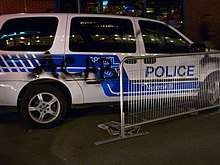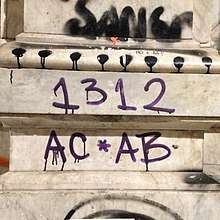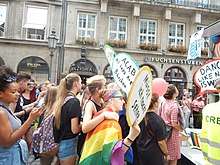A.C.A.B.
A.C.A.B. is a hate speech acronym meaning "All Cops Are Bastards".[1] It is used as a slogan and written catchphrase in graffiti, tattoos, and other imagery. It is sometimes numerically rendered as "1312", after the alphabetic order of the letters. The slogan is associated with dissidents subjected to political persecution and police brutality.
.jpg)
The intent of this the term may refer to the police as an institution, and does not necessarily reflect upon the individual law enforcement officer. Its use is a response to police actions that have historically been seen as abusive, obnoxious, corrupt, and vindictive.[2]
Critics of this term contend that the linguistic nature of this term inherently attacks police officers as individuals and believe other terms should be used in its place to support police reform.[3]
Background
Director Sidney Hayers used the phrase as the title of his 1972 crime drama All Coppers Are..., and the Dictionary of Catchphrases states that while the initialism—later seen in 1977 by a Newcastle journalist written on the walls of a prison cell—may be no older than the 1970s, the full phrase may date back as far as the 1920s.[4][5]

The acronym is often integrated into prison tattoos in the United Kingdom, commonly rendered as one letter per finger, alternatively sometimes seen as symbolic small dots across each knuckle.[6]
In Germany, usage of the term is a criminal offense when it refers to the honor of an individual, however when used to describe a large group of people, it is permitted.[7] The acronym is meant then, not as a personal insult, but a commentary on the institutional role of the police. Some police officers may be "bad apples," but the term refers to the police as an institution.[2] When an individual joins a police force, they become bound by their profession and their employer. It has also been shown that the job of a police officer tends to negatively affect the individual, sometimes causing PTSD. The police as an institution hold power over the people they patrol, helping to maintain social order of the nation-state, which may be against the interests of the public. This social order may be maintained through force or violence and can be seen in the origin of modern policing.[2]
Traditionally used by anarchists and punks, has recently been adopted broadly to reflect the institutional police brutality around the world. A good example of the acronym being a stand against the institution of police brutality is the mainstream attention in 2020 as a result of the killing of George Floyd and the protests that ensued following his killing.[8]
In certain contexts, the Anti-Defamation League categorizes the phrase as a hate symbol and describes it as "a slogan of long standing in the skinhead culture," while noting the phrase is used both by racist and anti-racist skinheads.[9][10]
ACAB and race
.jpg)
In the United States, working for the police has been a tool for upward social mobility. The story of Irish immigrants to the major cities of the US show the social rise of a community of people.[11] At first, the Irish were seen as a problem, and their discrimination and persecution increased after the large influx of immigrants resulting from the Great Famine. Economic hardship forced may of the immigrants to turn to petty theft. In fact, the Broad Street Riot in Boston led to the creation of the Boston Police Department and Boston Fire Department.[12][13] The irony being that the new police departments were created to control the Irish population.[11] Over time, the Irish gained political power in New York and Boston, and with the political power came patronage jobs, like being a police officer. In the close knot Irish community, these first jobs became employment networks. This was continued and supported by institutions like Tammany Hall, and inter-generational hiring. Once the Irish became a dominant force in policing, they use this power against other groups like Italians, Jews or African-Americans. However, in time, these groups followed the Irish path into policing.[11]
In the Southern states in the United States, policing originated the 18th century slave patrols.[14] The slave patrols were the first publicly funded law enforcement in the South.[15] The patrols captured and returned fugitive slaves, quashed slave rebellions, and other duties meant to reinforce white supremacy.[16] This continued after the Civil War. During the Reconstruction era, the slave patrol became white militias and groups, such as the Klu Klux Klan. The police forces of the began to take on the role of policing and regulating the movement of African-Americans who had gained their freedom. New laws were put in place to restrict their rights, which were known as Black Codes.[14]
While not police misconduct, the attitude of many police officers leads to a them versus us attitude that separates the institution from the people they serve. The police are taught to act immediately in life-threatening situations.[17] While they might try to de-escalate, more often than not they respond with force. This, along with implicit bias against people of color, can lead to negative consequences. Not only is the institution of policing set off from the public by these actions, but there appears to be little accountability for improper behavior and abuse of authority.[17]
In his book Race Matters, author Cornel West states that it is best to "understand the black freedom struggle not as an affair of skin pigmentation and racial phenotype but rather as a matter of ethical principles and wise politics."[18] This speaks to the Irish policing example, as well as the African-American experience in policing - when the individual joins the police, they are no longer an individual, but become part of the institution. Their livelihood and well-being are then tied to being able to maintain their status as part of the police community, and this may out them at odds with the communities they serve and where they came from. Author Samantha Podnar speaks of the concept of bastardization, where something becomes corrupt and no longer represents what it started as.[17] All Cops Are Bastards not because of flaws in their moral character, but because the institution they serve is corrupt.[17]
Prosecution history

Governments across the world, even in countries with free speech laws, are not always tolerant of that speech.[19] In Germany both "ACAB" and "1312" have been deemed insults by state courts. In 2015, the Federal Constitutional Court ruled in reference to the term "FCK CPS" (read as Fuck Cops) that an insult is only punishable when it is directed at a specific, identifiable group, but left interpretation of individual cases to the criminal courts.[20][21]
In Austria the use of A.C.A.B. was seen as "violating public decency," which could be punished under administrative law, for example by means of an administrative penal order. The fine could be up to 700 euros (or alternatively a week police detention).[22] In 2019, the Austrian Constitutional Court (VfGH) ruled that punishing the slogan as a violation of decency, in certain cases, violates the fundamental right to freedom of expression under Article 10 ECHR. The specific case involved a soccer fan who had waved an A.C.A.B. flag in the stadium. According to the VfGH, the banner should "primarily refer to the tense relationship between some football fans and the police and to express the negative attitude towards the police as part of the state's regulatory power" and should therefore "not be a concrete 'insult' to certain other people" . Therefore, the criticism expressed "should be accepted with a view to the special meaning and function of freedom of expression in a democratic society, taking into account all circumstances of the case."[23]
In other European countries, there are examples of police action towards people using ACAB in some fashion. Brian Stableford's 2009 Exotic Encounters states that "many years ago" during a fad for wearing ACAB shirts, a British youth was arrested for incitement to riot for wearing one, and ineffectively claimed the shirt stood for "All Canadians Are Bastards".[24] In January 2011, three Ajax football fans in the Netherlands were fined for wearing T-shirts with the numbers 1312 printed on them.[25] On 4 July 2015, a girl in Alicante, Spain, was fined for wearing a T-shirt with the acronym "ACAB" printed on it.[26] On 22 May 2016, a 34-year-old woman in Madrid, Spain, was charged under Article 37 of the Citizen Safety Law for carrying a bag displaying the acronym "ACAB" accompanied by the words "All Cats Are Beautiful".[27] The charges were dropped 3 days later.[28] On 15 September 2017, a man from Karlovac, Croatia posted a photomontage with the message "Fuck da Police A.C.A.B." from his Facebook profile. For this, he was later charged with violating the public order and fined €100 by the Misdemeanor Court in Karlovac.[29] On 4 April 2019, a 26 year old hockey fan was arrested for wearing a T-shirt that had a numeric version of "ACAB", 1312. "ACAB" and 1312 are both considered extremist information in Belarus.[30]
However, this is not just a European phenomenon. In 2018, a group of Persija Jakarta football fans in Indonesia were arrested for displaying a banner with the message "All Cops Are Bastards"[31] on it during the league match day.[32]
Other meanings
A large number of backronyms and variations have developed to All Cops Are Bastards. Among political progressives, some people use "All Cops Are Bullshit" or "All Cops Are Bad" since the term "bastard" may also be a racist term (i.e. "Rhineland Bastard"). In addition, there are other "left-wing" interpretations of the abbreviation such as All Colors Are Beautiful, All Capitalists are Bastards,[33] or All Communists Are Beautiful.[34]
In punk, skinhead and football culture there is the use of the term "eight cola eight beer" (German: 8 ColaBier). In addition, there is the anti-Semitic variant used by Neonazis A.J.A.B. (All Jews are Bastards).[35] The anarchist variant, "Anarchist Chaotics Argue Better.[36]
Variants
Similar phrases are used in various languages, though many still use the A.C.A.B. acronym.[37]
|
|
|
In popular culture

The abbreviation was often used musically in the 1980s. The 4-Skins, a British Oi! punk band, popularized the initialism A.C.A.B. in their 1980s song of the same name.,[38] as did the German punk band Slime. The term has also been used by the:
|
|
Used in film:
- ACAB – All Cops Are Bastards, a 2012 Italian film
See also
References
- Terry Victor; Tom Dalzell (2007). The Concise New Partridge Dictionary of Slang and Unconventional English. Routledge. p. 2. ISBN 978-1-134-61534-6.
- "ACAB: All Cops Are ... Bounded". Workers Solidarity Movement. 16 February 2015. Retrieved 14 May 2020.
- "BoardGameGeek". boardgamegeek.com. Retrieved 24 June 2020.
- Elliot, Paul (2014). Studying the British Crime Film. Columbia University Press. pp. 78–79. ISBN 978-1-906-73374-2.
- Partridge, Eric (1986). A Dictionary of Catch Phrases. Taylor & Francis. p. 1. ISBN 978-0-415-05916-9.
- Thompson, Tim; Black, Sue (2006). Forensic Human Identification: An Introduction. Taylor & Francis. p. 384. ISBN 978-0-8493-3954-7.
- "German free speech: ACAB is A-OK, but A-hole is a no-no". Deutsche Welle. 21 July 2016.
- Martinelli, Julieta (1 June 2020). "Dispatch From Atlanta's Nights Of Protests". Latino USA. NPR.
- "ACAB". Anti-Defamation League. Retrieved 30 May 2019.
- Guerra, Nicola. "Dalla strada alla letteratura, le spericolate e propizie vicende del forestierismo A.C.A.B.. Il contatto linguistico tra italiano e inglese nelle sottoculture Skinhead e Ultras" [From the road to literature, the reckless and auspicious events of the forestry industry A.C.A.B .. The linguistic contact between Italian and English in the Skinhead and Ultras subcultures]. Analele Universităţii Din Craiova, Seria Ştiinţe Filologice Linguistică Nr. 1-2. Universităţii din Craiova. Retrieved 3 June 2020.
- Gershon, Livia (18 December 2017). "How Stereotypes of the Irish Evolved From 'Criminals' to Cops". HISTORY.
- Browne, Patrick (17 March 2016). "Broad Street Riot, Boston, 1837". Historical Digression.
- Eliot, Samuel A. (1937). "Being Mayor of Boston a Hundred Years Ago". Proceedings of the Massachusetts Historical Society. 66: 154–73. JSTOR 25080323.
- Hassett-Walker, Connie. "George Floyd's death reflects the racist roots of American policing". The Conversation. Retrieved 11 June 2020.
- "The History of the Police" (PDF). SAGE Publications.
- "Slave Patrols and the Origins of Policing". Ella Baker Center. Retrieved 8 June 2020.
- Podnar, Samantha (1 June 2020). "ACAB Explained: Part One". NA Eye.
- Cornel West (5 December 2017). Race Matters. Beacon Press. p. 25. ISBN 9780807064344.
- Liptak, Adam (7 January 2019). "He Disparaged the Police on Facebook. So They Arrested Him". The New York Times.
- "Constitutional Court allows 'FCK CPS' sticker". The Local. 28 April 2015. Retrieved 17 August 2016.
- Federal Constitutional Court (28 April 2015). ""Kollektivbeleidigung" nur bei Bezug zu einer hinreichend überschaubaren und abgegrenzten Personengruppe" (Press release) (in German). Retrieved 25 February 2019.
- ³ 1 Abs. 1 Z.1 WLSG.
- "Verfassungsgerichtshof, E 5004/2018-11, Rz 22 ff" (PDF). 18 June 2019.
- Stableford, Brian (2009). Exotic Encounters: Selected Reviews. Wildside Press LLC. p. 26. ISBN 978-1-434-45760-8.
- "Football fans fined for anti-police t-shirt". DutchNews. 7 January 2011. Retrieved 17 August 2016.
- "Multa de 600 euros en Alicante por llevar una camiseta que pone "ACAB"". Yo Me Tiro Al Monte. 4 July 2015. Retrieved 17 August 2016.
- Hancock, Jaime Rubio (24 May 2016). "All Cats Are Beautiful or All Cops Are Bastards?". El País. Retrieved 26 May 2016.
- "Madrid police drop action against woman with All Cats Are Beautiful bag". El País. 25 May 2016. Retrieved 26 May 2016.
- "KARLOVČANIN DOBIO 100 EURA KAZNE JER JE NA FACEBOOKU NAPISAO ACAB Policija mladića koji nikad prije nije kažnjavan odmah prijavila prekršajnom sudu". jutarnji.hr (in Croatian). 24 January 2018. Retrieved 26 January 2018.
- "На парня из Минска составили протокол об экстремизме за четыре цифры на майке" [Youngster from Minsk detained for extremism for four numbers on T-shirt]. TUT.by. 11 June 2019.
- ultras persija. "ACAB". Archived from the original on 30 May 2020 – via Instagram.
- Nurdin Saleh (21 February 2018). "Terkenal di Kalangan Jakmania, Apa Arti ACAB dan Rojali?" [Famous among Jakmania, What are the Meanings of ACAB and Rojali?] (in Indonesian). Tempo.co.
- Boaventura, Nikone (28 May 2012). "All capitalists are bastards". @NikoneCons. Twitter.
- "'All communists are beautiful' as a t-shirt saying". Archived from the original on 29 November 2014. Retrieved 3 June 2020..
- Kai Von Appen (4 November 2013). ""A.C.A.B" beleidigt Polizistin: Vorsicht, Kopfschutz!" ["ACAB" insults police officer: Caution, head protection!]. Die Tageszeitung. Retrieved 6 September 2015.
- "Vorsicht: cop-ACAB-ana ist in Regensburg strafbar" [Caution: cop-ACAB-ana is punishable in Regensburg]. Regensburg Digital. 25 January 2012. Retrieved 27 February 2016.
- Cameron, Deborah; Panovic, Ivan (2014). Working with Written Discourse. SAGE. p. 142. ISBN 9781473904361.
- Woodman, Gordon (2009). The Journal of Legal Pluralism and Unofficial Law 57/2008. LIT Verlag Münster. p. 53. ISBN 978-3-643-10157-0.
- ACAB on YouTube
- "A.C.A.B. Lyrics". Archived from the original on 24 September 2016. Retrieved 2 June 2020.
- "Paul Elstak Featuring Leo Sex / Paul Elstak & Firestone – A.C.A.B. (All Cops Are Bastards) / Retaliate". discogs.com. Discogs. Retrieved 27 February 2016.
- Estevão Ribeiro do Espinho (2015). 101.3 megahertz: lyrics and letters from the Spectators Of Suicide (in German). Books on Demand. ISBN 978-3-7386-5496-7 – via books.google.com.
External links
- "The Case of Mr. B (ACAB Case)". Global Freedom of Expression. Columbia University. Retrieved 29 May 2020.